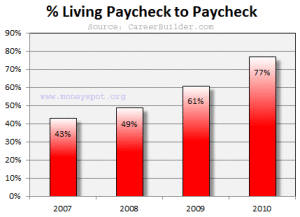 Living pay check to pay check is something that many people do all over the US and Canada, as well as around the world. We normally talk about retirement planning and getting ready for retirement, however we felt that this topic was so important that we wanted to post it here on this website. If you can get your monthly budget under control and develop some savings, you will be at far less risk of losing your home as well as being ready to retire when the time comes. Saving money around the home will make it much easier to survive a job loss and other major expenses that you have not planned for.
Living pay check to pay check is something that many people do all over the US and Canada, as well as around the world. We normally talk about retirement planning and getting ready for retirement, however we felt that this topic was so important that we wanted to post it here on this website. If you can get your monthly budget under control and develop some savings, you will be at far less risk of losing your home as well as being ready to retire when the time comes. Saving money around the home will make it much easier to survive a job loss and other major expenses that you have not planned for.
The following survey is a sad picture of Canadian savings habits. It also high lights the exposure that over 60% of Canadians have to lose their homes, cars and more if they were to lose their jobs. We suspect that Americans are in the same position. The blunt advice that these people need to follow is :
- Save 10% of your paycheck every month
- Have 3 months salary in savings available if you should lose your job
- Get your budget under control and learn to live with less money so you can prepare for the future.
Living Pay Check To Pay Check – Survey
The results of the survey follow and it is a sobering message for many Canadians.Almost 60 per cent of Canadians live pay check to pay check and say they’d be in financial difficulty if their pay check was a week late.
A new survey from the Canadian Payroll Association released Monday showed some troubling signs about Canadians’ personal finances.
The 59 per cent figure is the same rate as the one found in last year’s survey. It is the second year that the agency has undertaken the payroll survey.
Almost half of respondents to a national survey said they are saving five per cent or less of their income. Financial planning experts generally recommend a retirement savings rate of about 10 per cent of net pay. Also save three months’ worth of expenses in an emergency fund.
Although they don’t appear to be having much success doing so, 60 per cent of respondents said they were trying to save more money than they used to. The remaining 40 per cent said they were not trying to save any money at all.
“The most significant result of Canadians continuing to live pay check to pay check is its impact on their concerns about personal finances and retirement.
Younger workers feel especially vulnerable. 65 per cent of respondents aged 18 to 35 saying they would find it difficult to make ends meet if they missed a single pay check.
More than two thirds (69 per cent) of respondents said it would be difficult to find comparable employment with a similar salary if they lost their job.
For the survey, the agency interviewed 2,766 Canadian employees across the country. The survey is considered to be accurate within 1.86 per cent, 19 times out of 20.
It was taken between June of 2009 and July of 2010.
“End of Survey”
In case US citizens are reading this and feel that they may be better off than Canadians, think again. You have just gone through and are beginning to come out of a major recession which Canada pretty much avoided. You need to adopt these savings approaches even more than Canadians. Jobs are more difficult to come by in the US than they are in Canada.
In fact emergency savings are probably the single most important thing to think about. This is next to putting food on the table and paying for somewhere to live. Invest wisely and conservatively. If you are able to save a lot of money, diversify and avoid the get rich quick schemes. Only a few people succeed at this approach and most just end up losing their hard earned savings. Hire a competent financial manager, but always do your own research and make your own decisions.
my husband taught our kids to save 10% of their salary regardless of how much they made each week. They got into the habit of saving like this and were able to graduate from university with no loans and now also both have great jobs and a large savings built up for a rainy day.